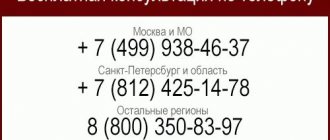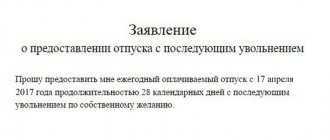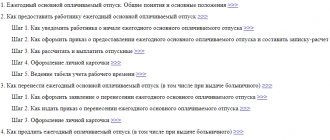- home
- Reference
- Pension for working pensioners
Getting an old-age pension is not a reason to leave work. The reasons why citizens stay in their jobs are different: lack of money, the desire to remain in demand in society, etc.
But not everyone knows that leave for the elderly category of workers under the legislation of the Russian Federation has its own nuances and additional privileges. Let's consider the features of providing guaranteed and additional rest, the rules for calculating vacation pay and other issues related to this issue.
Does a pensioner have the right to days at his own expense?
Leave without pay for working pensioners is the right of an employee of retirement age (Article 128 of the Labor Code). The number of days is 14, but by agreement with the management, their number may be greater.
Reference! It is advisable not to go beyond the 14 free days of rest required by law, as this will affect the length of service taken into account, which gives the right to a paid vacation period.
For a certain category of the elderly working population, the duration of additional days of well-deserved “vacations” can be increased in accordance with Russian legislation.
Unpaid days can be combined with basic legally guaranteed leave , or used separately or in parts. The basis for granting “vacations” without saving a salary is a statement written by the pensioner.
Additional free leave is not recorded in the vacation schedule, but is necessarily taken into account in the working time sheet.
Attention!
In prosecutorial practice, issues related to the protection of the labor rights of working pensioners often arise. First of all, this concerns the procedure for granting leave without pay.
In accordance with the requirements of paragraph 3, part 2, art. 128 of the Labor Code of the Russian Federation, the employer is obliged to provide unpaid leave to working old-age pensioners (age) - up to 14 calendar days per year based on a written application from the employee.
It seems that everything is very simple: a working pensioner needs to write a statement to his manager and rest quietly for two weeks “at his own expense.” But the results of supervisory activities indicate the opposite. The employer does not always correctly understand his obligation to comply with the employee’s right to this type of leave provided for by law, and sometimes working pensioners themselves are mistaken and demand from management what is not provided for by the Labor Code of the Russian Federation.
For example, a 57-year-old woman turned to her employer with a written application for leave without pay for 28 calendar days, citing the fact that in the previous two years she had not exercised her right under Article 128 of the Labor Code of the Russian Federation. The employer justifiably refused to provide her with leave in this amount, justifying this by the fact that Article 128 of the Labor Code of the Russian Federation obliges him to provide leave without pay to working old-age pensioners (by age) up to 14 calendar days a year. The Labor Code of the Russian Federation does not directly indicate the possibility of working pensioners transferring unused vacations without pay to the next year. The possibility of transferring vacation to the next year is established only by Article 124 of the Code, which provides for the transfer of annual paid leave. Therefore, this article cannot be the basis for transferring and summing up leave without pay for working pensioners.
A different situation was faced by a man who in February wrote an application for 14-day leave without pay for family reasons and implemented it with the consent of the head of the enterprise. In August, the employee celebrated his 60th birthday and continued his career. When he decided to exercise his right to leave without pay in October of the current year as a working pensioner, he was refused by the employer on the grounds that the employee had already been provided with such a labor guarantee during the calendar year.
These actions of the employer are illegal, because violate the provisions of Article 128 of the Labor Code of the Russian Federation. According to Part 1 of this provision of the law, for family reasons and other valid reasons, an employee, upon his written application, may be granted leave without pay, the duration of which is determined by agreement between the employee and the employer. In the above situation, the employer has already agreed to provide leave without pay in the first half of the year, that is, he recognized the reason for the employee’s absence as valid. Upon reaching retirement age, the employee has the right to: apply for a pension and continue to work or resign at his own request (in connection with retirement - clause 3, part 1, article 77, part 3, article 80 of the Labor Code of the Russian Federation). If an employee who has reached retirement age continues to work, then he continues to be subject to all labor rights and obligations provided for by labor legislation. Article 128 of the Labor Code of the Russian Federation establishes that the employer is obliged, on the basis of a written application from the employee, to provide unpaid leave to working old-age pensioners (age) - up to 14 calendar days a year. Since the first leave without pay was granted to the employee in the first half of the year before acquiring the status of a pensioner who continues to work, and then he received an old-age pension and continued to work, then, upon his written application, the employer is obliged to provide leave without pay for a period of up to 14 calendar days .
In case of refusal to grant leave without pay in this situation, the manager may be held administratively liable under Part 1 of Art. 5.27 of the Code of the Russian Federation on Administrative Offences.
Prosecutor of the Department for Ensuring Participation
prosecutors in civil and arbitration proceedings
Prosecutor's Office of the Khabarovsk Territory
Tatiana Doskova
How many days can you apply?
All working pensioners, without exception, are entitled to leave at their own expense. The duration of such rest will depend on the category of the beneficiary.
According to the Labor Code, the duration of the “free” vacation period is:
- for WWII participants – 35 days;
- for military pensioners (combatants) – 35 days;
- for labor veterans – 35 days;
- for disabled people – 60 days;
- for parents and wives of military personnel – 14 days.
For working pensioners who are not included in the list of preferential categories listed above, a standard option of additional leave for two weeks is provided.
Important! An elderly employee has the right to take advantage of legal additional leave for family reasons: death of a loved one, marriage, birth of a child in the family, etc. Number of days - 5.
Unpaid leave can be initiated by the manager himself. In this case, he is obliged to obtain a written consent-application from a working retired employee.
In case of refusal to consider the application or provide the employee with days without pay, you can file a claim with the courts. Protecting your interests in court is the right of every Russian.
According to the same Article 128 of the Labor Code of the Russian Federation, a citizen has the right to end his vacation early and return to work. In this case, he will need to warn his superiors about his decision.
Days for medical examination
From 01/01/2019, an additional privilege was introduced in relation to older employees and pre-retirees. According to Article 185.1 of the Labor Code of the Russian Federation, a working pensioner has the right to arrange additional paid days for undergoing a medical examination at a clinic.
The Labor Code guarantees two working days once a year. For these two medical examination days, the employee is entitled to payment in the amount of average earnings. To issue them, you must:
- Coordinate the time of medical examination with the medical organization.
- Write an application addressed to the employer.
- Agree the application with management.
- Read the order on providing paid days.
This period is not a vacation, since the days are provided not for rest, but for undergoing medical examination. An employer can verify that an employee has undergone a medical examination, but the employee himself is not required to provide evidence of completion, at least for now.
If you need to solve unexpected family problems, it is better to arrange leave for working pensioners without pay (Articles 126 - 128 of the Labor Code of the Russian Federation).
Sample application for paid additional leave
Sample application for unpaid leave
Read more about HOLIDAY PAYMENTS
- recommendations and assistance in resolving issues
- regulations
- forms and examples of filling them out
ConsultantPlus TRY FREE
Legal documents
- Labor Code
- Article 117 of the Labor Code of the Russian Federation. Annual additional paid leave for employees engaged in work with harmful and (or) dangerous working conditions
- Article 118 of the Labor Code of the Russian Federation. Annual additional paid leave for the special nature of the work
- Article 119 of the Labor Code of the Russian Federation. Annual additional paid leave for employees with irregular working hours
- Law of the Russian Federation of February 19, 1993 N 4520-1
- Article 126 of the Labor Code of the Russian Federation. Replacing annual paid leave with cash compensation
- Article 128 of the Labor Code of the Russian Federation. Leave without pay
- Article 185.1 of the Labor Code of the Russian Federation. Guarantees for employees when undergoing medical examination
- Article 126 of the Labor Code of the Russian Federation. Replacing annual paid leave with cash compensation
- Article 128 of the Labor Code of the Russian Federation. Leave without pay
Additional privileges
Russian legislation provides for working pensioners the possibility of a “maternity leave” to care for a grandson or granddaughter until they reach 3 years of age.
In addition, older employees are entitled to a reduced work schedule. He has the right to resign on the day of retirement without the required two weeks of work.
When an employee is dismissed due to retirement, he is required to compensate him with money for days of unused legal leave on the basis of Article 126 of the Labor Code of the Russian Federation.
For pensioners working in the northern regions of the Russian Federation, the employer is obliged to pay round trip travel to the vacation spot. This right can be used once in two years. This also applies to paying for travel in your own car. Only travel and baggage costs are paid. Travel expenses are also provided for minors traveling with their grandparents.
Features of providing additional leave
Let's start with Art. 128 Labor Code of the Russian Federation. Vacation without pay for maintenance is guaranteed regardless of the consent of the administration:
- for old-age pensioners – 14 days;
- WWII participants - 35 days;
- disabled people of retirement age - 60 k.d.
For labor veterans, according to Art. 128 of the Labor Code of the Russian Federation, an increase in additional leave is not provided. If they wish to take additional time off, they can count on the standard 14 days a year. Beyond this period, the specified type of rest can be provided to them on the basis of Art. 22 FZ-5 dated 12/01/95 “On Veterans”, if a corresponding legal act has been adopted in a constituent entity of the Russian Federation.
According to the norms prescribed by Art. 116, 117-119 of the Labor Code of the Russian Federation, pensioners are given additional paid leave if:
- they work in harmful (dangerous) conditions;
- they work for Kr. The North and regions legally equivalent to it;
- their nature of work is recognized as special at the level of the Government of the Russian Federation;
- they work under irregular working hours.
In addition, a working pensioner, if he has the status of a civil servant, can count on a longer vacation than the standard one - from 30 days or more, depending on length of service (Article 46 of the Federal Law-79 dated 07/27/04 " About the civil service"). The legislation defines 30 days of vacation as the main one, and days of length of service are classified as additional paid vacation days.
Similar provisions apply to municipal employees (Article 21 of Federal Law No. 25 of 02/03/07 “On Municipal Service”), including those of retirement age who continue to work.
On a note! A retired employee can go on parental leave if he has grandchildren (Article 256 of the Labor Code of the Russian Federation).
Basic and additional paid leave can be summed up (Article 120 of the Labor Code of the Russian Federation). At the same time, based on the norms of Art. 128 of the Tax Code of the Russian Federation, you cannot accumulate additional vacations at your own expense. Only one additional leave of the longest duration is provided. This rule is relevant in the case when a working pensioner has the right to receive additional leave for several reasons specified in the article. In addition, a pensioner may have the right to take additional days of vacation according to regional legislation if he is a labor veteran. This factor is also taken into account when choosing the basis for vacation.
Briefly
- Additional leaves for pensioners who continue to work are issued on the basis of Art. 128 Labor Code of the Russian Federation. They are not paid. Their duration depends on the status of the pensioner. Disabled people and WWII veterans are given longer leaves.
- If there are several reasons to go on such leave, the terms are not summed up, but the longest legal period is selected and leave is issued on this basis.
- Unpaid leave may be granted to labor veterans based on decisions of regional authorities.
- Paid leave, in addition to the main one, is provided to older employees if they work in special conditions that differ from standard conditions, or are state or municipal employees. The duration and conditions of such leave are regulated by a number of federal laws.
Helpful information
"Vacations" at their own expense have some features. For example, certain provisions for paid leave do not apply to unpaid leave.
- If a person did not have time to rest at his own expense this year, in accordance with labor legislation, then the unused days will not be carried over to the next year, as is the case with the main vacation.
- If during the period of free rest an employee suffers from illness, then sick leave will not be paid to him and the rest will not be extended due to illness.
- For length of service, only 14 days of unpaid “vacations” are taken into account.
Attention! Additional days of rest can, by agreement of the parties (boss and retired employee), be replaced by cash payments. The exception is working in hazardous industries.
Design rules
There are no special rules for providing vacation pay. Based on the order, the accounting department accrues vacation pay to the employee. The order acts as confirmation of the pensioner’s absence from the workplace.
Additional paid days of rest are requested by sending an application to the manager.
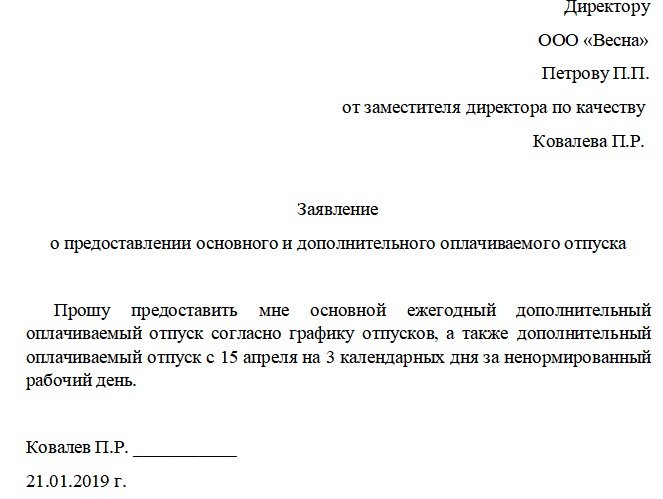
Usually the days are taken along with the main vacation period. But the rest can be divided, at the request of the employee. The period is paid according to the same rules.
Days of additional rest that exceed the minimum legal standards can be replaced with monetary compensation (Article 126 of the Labor Code of the Russian Federation). In addition, upon dismissal, additional leave is included in the calculation of compensation for unused vacation pay.
How to write a statement correctly
An example of a correct application form is posted below. The header of the document indicates to whom and from whom it was written, and the text itself records the date from which leave is required and the number of days. It is not necessary to indicate the reason why a person decided to rest, but it is advisable. In practice, you can often encounter refusals due to the absence of a reason or legal basis in the text.
The document can be drawn up by hand or printed. Be sure to indicate that the applicant is a pensioner and attach a copy of the pension certificate or certificate from the Pension Fund.
For valid reasons related to family circumstances: death of a loved one, birth of a child, wedding, illness of a relative, etc., there should be no refusals.
Typically, unpaid leave is used on an emergency basis when urgent matters or circumstances arise. The application is submitted to management for consideration a couple of days before the start date specified in the application. This time is quite enough for the boss to approve it and create a corresponding order for the enterprise.
Application example:
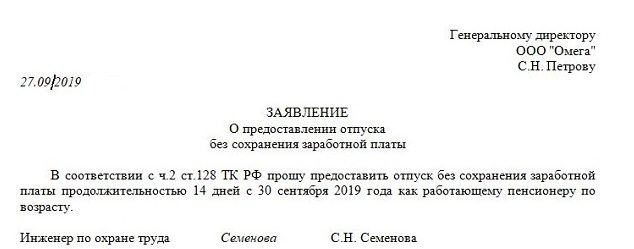
If the main leave must be coordinated and the right to rest strictly in accordance with the drawn up schedule, then unpaid days are provided immediately upon the written request of the older employee. The employer is obliged to issue an additional order upon application. leave without pay.
It is illegal to recall a person from vacation ahead of schedule . An exception may be force majeure circumstances that require the immediate presence of a retired employee at the enterprise.
Leave to care for grandchildren
A grandmother or grandfather has the right to arrange for the care of a grandson or granddaughter until they reach the age of 3. To do this, 10 days before the start of the date specified in the application, an application written in free form is submitted.
Such leave is issued either for the entire period of care or for a certain period. In this case, the first part is paid, the second is without content. In any case, during maternity leave, the rate remains the same, and the period of care is counted towards the length of service.
When are these extra weeks available?
At any convenient time. Including adding it to the next annual vacation or breaking it into several parts. It should be noted, however, that the Labor Code of the Russian Federation does not approve rules and regulations according to which additional leave without pay (including for an employee receiving an old-age pension) will be provided during the specific period specified in the employee’s application. Thus, the issue of timing is subject to agreement with the employer.
Features of registration of the next paid leave
Workers in a number of industries, despite receiving a pension, can remain in demand and benefit society.
Examples include:
- Teachers at universities.
- Highly qualified production specialists.
- Watchmen.
- Security guards, etc.
There are preferential professions that give a person in adulthood the opportunity to earn up to 50 thousand rubles or more.
Reference! According to the Labor Code of Russia, every Russian has the right to paid leave lasting 28 days. This also applies to people of pre-retirement age and those who have retired.
The vacation period is agreed upon with employees in advance. And at the end of the current year, a schedule is drawn up for the next year, which employees must strictly adhere to.
How many days are there?
Planned and paid days of rest for the working category of pensioners amount to 28 days. An exception may be employees who, due to their occupation or place of residence, are entitled to a longer vacation. This includes special working conditions, hazardous production, northern climate, etc.
Additional days
For some citizens, additional paid days are provided:
- for residents of the Far North – 24 days;
- for persons living in areas similar in conditions to the north – 16 days;
- for citizens working in remote corners of Russia or in areas with a special climate - 8 days;
- when working in an occupation that is hazardous to health – 7 days;
- for accident liquidators and victims – 14 days;
- for disabled people – 6 days;
- for employees with irregular work hours – 3 days.
According to Art. 185.1 of the Labor Code of the Russian Federation, all retired working employees, without exception, are released from work for a couple of days to undergo a medical examination at the clinic at their place of residence. These days are paid days.
Accrual of vacation pay
The calculation is carried out according to the following scheme:
- The average daily earnings are calculated. To do this, a certain period is selected, for example, last year, and all days and hours worked are taken into account.
- The cash payments received by the pensioner for a given period are summed up.
- The total salary is then divided by the number of days worked.
- The result is the amount of payment for one day of “vacation”.
- The result obtained is multiplied by the number of days for rest approved by the manager. This will be the amount of vacation pay.
Important! Payments must be accrued and paid to the employee no less than three days before the start of the vacation.
Paid vacation
Reaching retirement age is not grounds for terminating an employment relationship with an employer. Such an employee has the right to continue working. Of course, if his health allows him to occupy the designated position. An employer does not have the right to demand dismissal from a subordinate who has applied for a pension.
In addition to the guarantee of job security, a working pensioner has the right to apply for annual leave. The standard duration of rest is 28 calendar days. Working pensioners are not entitled to additional leave in 2021 on a general basis.
If an older worker works under special conditions, he has the right to additional paid vacation days. The grounds are enshrined in the Labor Code of the Russian Federation, these include:
- Harmful and dangerous working conditions - Art. 117 Labor Code of the Russian Federation.
- Special working conditions - art. 118 Labor Code of the Russian Federation.
- Irregular working hours - Art. 119 Labor Code of the Russian Federation.
- Work in special climatic conditions (regions of the Far North and equivalent areas) - Art. 14 of the Law of the Russian Federation of February 19, 1993 No. 4520-1.
If a pensioner’s work does not meet the stated working conditions, then additional paid days of rest are not allowed. But every rule has exceptions. Therefore, the question of whether working pensioners are entitled to additional paid leave remains relevant.
The employer has the right to provide additional time for paid rest on his own initiative. Such periods must be specified in the company’s local regulations, collective and labor agreements. Additional vacation days can be established for any category of subordinates. For example, in relation to older workers and employees with young children.
In addition, employees can prepare a petition addressed to the employer for the provision of rest days. The rules for provision and payment procedure depend on the financial capabilities of the company. All legal provisions and norms must be documented. But the employer has the right to refuse additional allowance.
